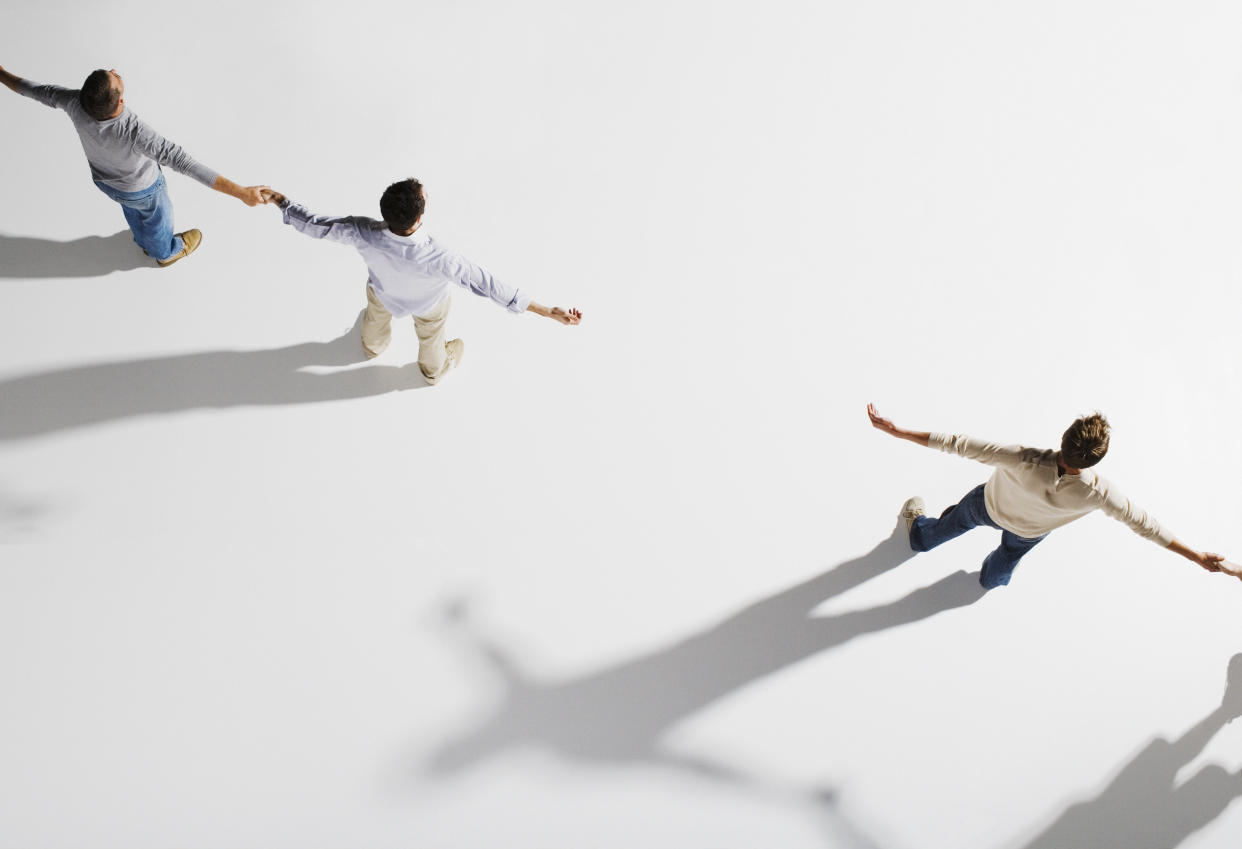Party invites, handshakes, personal space: What’s the etiquette as social distancing rules ease up?

As many states begin easing their stay-at-home orders and restrictions on businesses and public places, citizens must decide for themselves whether to heed the advice of health experts and continue to social distance and wear face masks. Some prefer to err on the side of caution until the coronavirus pandemic is no longer a global threat; others are eager to return to their normal life — and the in-person socialization that comes with it.
But what happens when these two different subsets encounter each other? If you are committed to flattening the curve, how do you tactfully respond to social invitations or physical contact from those who have lowered their guard? What’s the best way to establish boundaries without causing offense — or succumbing to anger?
And if you’re the one who has hung up your face mask and left social distancing in the dust, what should you bear in mind when it comes to respecting the concerns of others who aren’t comfortable rushing back into the world of hugs, handshakes and backyard barbecues?
National etiquette expert Diane Gottsman of the Protocol School of Texas tells Yahoo Life that “we have to realize that everyone has a different comfort level; it’s going to be slow entry, and right now it’s still a very delicate time.”
It’s OK to turn down an invitation
As summer approaches, some might be tempted to resume their wedding plans, or throw a pool party. But Gottsman says that people should not feel “obligated” to attend an event that doesn’t feel safe. She notes that, when RSVPing, “no” has always been an option, pandemic or not, and “you don’t necessarily have to give a reason.”
If pressed, address your concerns, but be gracious.
“You can just say, ‘I am still being cautious, but I appreciate the invitation,’” she suggests. “That’s for Mother’s Day, that’s for a baby shower, that’s for anything ... The message here is that we should be courteous, but we should not ... feel guilty for declining an event if we’re uncomfortable.”
Peggy Parks, a business etiquette and civility expert for the Parks Image Group in Atlanta, has drawn on some of her own personal experiences when reflecting on how to best navigate potentially thorny issues. When neighbors invited her and her boyfriend to a socially distanced dinner, Parks tells Yahoo Life, she initially accepted. But after taking into consideration the risks involved, given factors like age and underlying health conditions, she grew uneasy and had to backtrack.
The six feet of social distancing isn’t empty space — it’s a safe space. Check out the below experience that fills your space with something beautiful while we await a healthier world.
“I called our friends and told them I did not feel comfortable having dinner at their home,” she shares. “They understood. The secret? Be kind, calm and make them understand how you feel. Be honest, be humble and be thoughtful.”
Party hosts, adds Gottsmann, should be “understanding” and not take a declined invitation as a personal snub.
“You can extend the invitation, but also understand that this is not going to be a time where everybody is going to jump on that invitation,” she notes. “Much like anything else, when you extend an invitation, it’s not an obligation for them to come. And you can let them know, ‘We’re going to practice social distance and I’m making every effort to make this environment friendly but safe.’ But also understand that some people will still be very cautious.”

Suggest a friendly handshake or hug alternative
As businesses gradually reopen and more people get out and about, some may consider emerging from their quarantine pods to reconnect with old friends or relatives. But that doesn’t mean physical contact has to be on the agenda. Whether you’re swinging by a friend’s driveway or stopping to greet a neighbor, you’re under no obligation to offer a handshake or hug, especially as the risk of transmitting COVID-19 is still very much present.
Parks suggests saying, “I’d love to shake your hand, but am trying to be safe.” Offering a sincere smile or alternate greeting, like a foot tap or bow, can alleviate any awkwardness.
Gottsman agrees, recommending using a “very kind tone of voice” while explaining, “I am still practicing social distancing but I’m so happy to see you.”
That way, she says, “your words are positive, but your actions are still clear that you’re not extending the handshake.”
Back up — but try not to lash out
If you’re committed to observing strict social distancing for the foreseeable future, it can feel overwhelming or invasive if someone — whether it’s a friend or a delivery person — comes within six feet of you, especially if they aren’t wearing a mask. If meeting with someone at your home, such as a landscaper or real estate agent, Parks suggests communicating ahead of time that you are taking precautions. That way, the visitor will clearly understand the ground rules in advance, and has enough time to back out if they disagree.
If someone does get too physically close, Gottsman advises distancing yourself while saying, “If you wouldn’t mind, I’m going to take a few steps back.” Explaining that you are social distancing should do the trick, though she notes that it’s important to avoid calling out others or appear to judge their behavior — particularly if you don’t know how they might react.
“You have to be polite, you have to be assertive, but you also have to be aware that you could incite someone,” she explains. “You might just have to remove yourself from the situation depending on your comfort level.”
Accept that things aren’t quite back to “normal”
As some Americans rush back to the hair salon and golf courses, and others anxiously stay indoors, experts say it’s natural for there to be some uncertainty and awkwardness about how to move forward.
Being mindful of the ongoing risks of socialization is, of course, paramount. Dr. Dara Kass, an associate professor of Emergency Medicine at Columbia University Medical Center and a Yahoo News Medical Correspondent, says that reconnecting with friends and family members requires having “frank conversations” and outlining clear expectations about what precautions will be taken, if any.
“Assume that everyone (including you) is an asymptomatic carrier who will get others sick,” she says. “Act like they will infect you, and you will infect them. And if you do decide to interact with someone without these precautions, make sure that you’ve actively accepted that risk.”
Adds Gottsmann: “There are some areas that are going back to what we would have considered normal, but it’s not a normal time. So people are entering this environment with caution, and this is not the time to drop your guard. This is the time to be vigilant.”
Social distancing is a part of our everyday lives. The below experience allows you to place art in the space between. Place the image in front of you and move it around to line up with your loved one.
For the latest coronavirus news and updates, follow along at https://news.yahoo.com/coronavirus. According to experts, people over 60 and those who are immunocompromised continue to be the most at risk. If you have questions, please reference the CDC’s and WHO’s resource guides.
How to maintain your physical and mental health during the pandemic
Taking care of a loved one with COVID-19? Here’s how to stay healthy
Q&A with Dr. Kavita Patel: How to keep your family safe and maintain your mental health
Read more from Yahoo Life:
High school holds personal, front-yard graduation ceremonies for seniors
These 8 foods will boost your immune system and overall health
Want daily lifestyle and wellness news delivered to your inbox? Sign up here for Yahoo Life’s newsletter.



